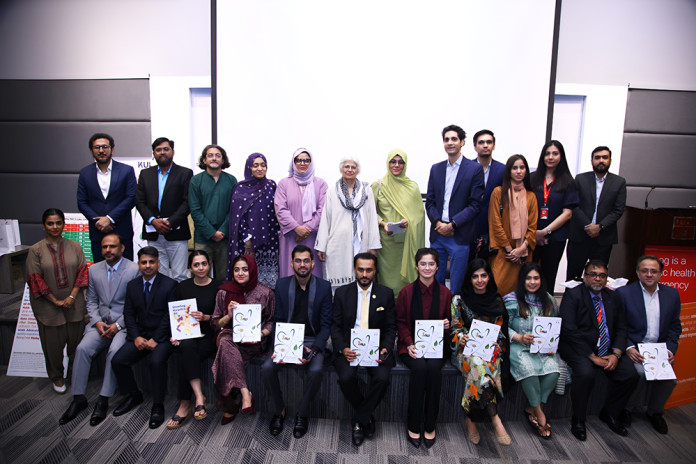Marking World Environment Day, Bank Alfalah, in collaboration with the Pakistan Air Quality Initiative (PAQI) and Karachi Urban Lab (KUL), a research facility at Institute of Business Administration (IBA), unveiled a report titled “Karachi Emissions Inventory – A Scientific Foundation for a Clean Air City.” The report is based on the results of 13 newly installed air quality monitors funded by Bank Alfalah, and offers the city’s most comprehensive, evidence-based analysis of air pollution sources.
Positioned across various high-density zones like Saddar, Korangi, Gadap, North Nazimabad, and Clifton, the monitors measure PM2.5, SO₂, NOₓ, and CO₂, critical pollutants that affect urban health and quality of life. Based on international best practices and local data, the inventory sheds light on the root causes of Karachi’s air quality crisis.
Key findings reveal that Karachi produced 394.82 kilo tons of emissions, with industry
contributing 49% and transport 33% of the PM2.5 load. Power generation, largely reliant on high-sulfur fuel, accounted for 30% of sulfur dioxide emissions, while residential emissions were negligible due to Karachi’s warmer climate.
Despite the challenge, Karachi’s coastal location provides some respite with natural sea
breeze circulation aiding pollutant dispersion, though background levels remain elevated due to marine salt and desert dust.

The report was launched at an event held at IBA, followed by a policy dialogue that urged
cross-agency coordination, improved monitoring, public health alerts, and green financing to transition towards a cleaner, more sustainable city.
“Karachi’s air quality crisis is local, not inevitable. Our report shows that with targeted, evidence-based interventions, especially in industrial regulation and transport policy, meaningful change is possible within five years,” added Abid Qamar, Founder of Pakistan Air Quality Initiative (PAQI).
“Bank Alfalah is proud to support the scientific foundation needed to tackle urban air pollution and create a healthier environment for all,” said Madiha Javed Qureshi, Head of Corporate Communication and CSR at Bank Alfalah. “As a responsible Corporate Communication Bank, we look forward to supporting causes that require attention. The banking sector also invests in innovative solutions for green financing to help accelerate the
transition toward sustainability.”
The Karachi Emissions Inventory provides a crucial starting point for policymakers, urban
planners, and civil society to collaborate on transformative solutions.

As part of its broader commitment to a sustainable future, Bank Alfalah has pledged USD 10 million under the leadership of its Chairman, Sheikh Nahayan Mabarak Al Nahayan and Board to support climate resilience and environmental wellbeing. Advancing this commitment, the Bank also launched the #GreenWayForward initiative in collaboration with
WWF-Pakistan, through which 35,000 mangroves will be planted along the coastline of
Pakistan in 2023 and 2024. This effort contributes to Bank Alfalah’s long-term pledge of
planting 100,000 trees by 2030 in partnership with WWF-Pakistan, reinforcing its
dedication to environmental stewardship.
The Bank’s green financing portfolio now stands at PKR 26.6 billion, reflecting its dedication
to cleaner technologies and sustainable practices. Currently, 155 Bank Alfalah ATMs are
powered by solar panels, resulting in the offset of 193 tonnes of carbon dioxide equivalent
in 2024. Furthering its clean energy efforts, the Bank has also converted its Sheikh Bhirko
branch to a 30 kW solar hybrid system, a first-of-its-kind green branch which will reduce carbon emissions.
The Bank has also made advances in waste management, recycling, and efficient water
consumption by partnering with International Finance Corporation (IFC) as an advisor to
guide its green banking journey.


